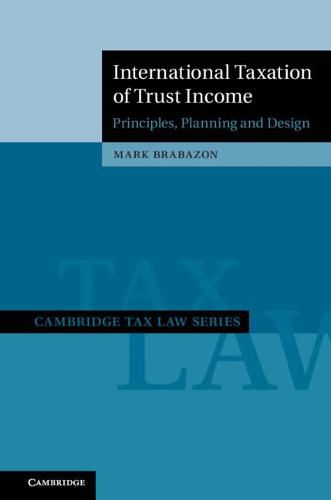Readings Newsletter
Become a Readings Member to make your shopping experience even easier.
Sign in or sign up for free!
You’re not far away from qualifying for FREE standard shipping within Australia
You’ve qualified for FREE standard shipping within Australia
The cart is loading…






In International Taxation of Trust Income, Mark Brabazon establishes the study of international taxation of trust income as a globally coherent subject. Covering the international tax settings of Australia, New Zealand, the UK, and the US, and their taxation of grantors/settlors, beneficiaries, trusts, and trust distributions, the book identifies a set of principles and corresponding tax settings that countries may apply to cross-border income derived by, through, or from a trust. It also identifies international mismatches between tax settings and purely domestic design irregularities that cause anomalous double- or non-taxation, and proposes an approach to tax design that recognises the policy functions (including anti-avoidance) of particular rules, the relative priority of different tax claims, the fiscal sovereignty of each country, and the respective roles of national laws and tax treaties. Finally, the book includes consideration of BEPS reforms, including the transparent entity clause of the OECD Model Tax Treaty.
$9.00 standard shipping within Australia
FREE standard shipping within Australia for orders over $100.00
Express & International shipping calculated at checkout
In International Taxation of Trust Income, Mark Brabazon establishes the study of international taxation of trust income as a globally coherent subject. Covering the international tax settings of Australia, New Zealand, the UK, and the US, and their taxation of grantors/settlors, beneficiaries, trusts, and trust distributions, the book identifies a set of principles and corresponding tax settings that countries may apply to cross-border income derived by, through, or from a trust. It also identifies international mismatches between tax settings and purely domestic design irregularities that cause anomalous double- or non-taxation, and proposes an approach to tax design that recognises the policy functions (including anti-avoidance) of particular rules, the relative priority of different tax claims, the fiscal sovereignty of each country, and the respective roles of national laws and tax treaties. Finally, the book includes consideration of BEPS reforms, including the transparent entity clause of the OECD Model Tax Treaty.